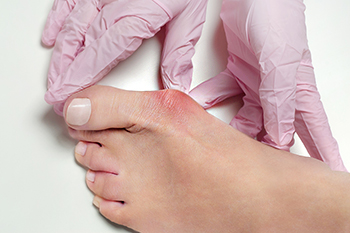 Hallux rigidus, or stiff big toe, is a form of arthritis affecting the joint at the base of the big toe, leading to pain and stiffness. This condition occurs due to the wear and tear of the cartilage in the joint, which can be accelerated by repetitive stress, injury, or genetic predisposition. It commonly affects adults over 30, especially those with a history of foot injuries, or occupations that place significant stress on the feet. Symptoms can include pain and stiffness in the big toe during movement, swelling surrounding the joint, and difficulty in bending the toe. Over time, bone spurs may develop, further limiting motion and causing discomfort. Complications of untreated hallux rigidus can include chronic pain, difficulty walking, and an altered gait, leading to additional foot, knee, hip, or back problems. Prevention involves wearing supportive shoes with a wide toe box, avoiding high heels, and performing foot exercises to maintain flexibility. Treatment options range from non-surgical methods, such as anti-inflammatory medications, orthotics, and targeted stretching exercises, to surgical intervention, in severe cases. If you have a stiff and painful big toe, it is suggested that you schedule an appointment with a podiatrist for an accurate diagnosis and effective treatment.
Hallux rigidus, or stiff big toe, is a form of arthritis affecting the joint at the base of the big toe, leading to pain and stiffness. This condition occurs due to the wear and tear of the cartilage in the joint, which can be accelerated by repetitive stress, injury, or genetic predisposition. It commonly affects adults over 30, especially those with a history of foot injuries, or occupations that place significant stress on the feet. Symptoms can include pain and stiffness in the big toe during movement, swelling surrounding the joint, and difficulty in bending the toe. Over time, bone spurs may develop, further limiting motion and causing discomfort. Complications of untreated hallux rigidus can include chronic pain, difficulty walking, and an altered gait, leading to additional foot, knee, hip, or back problems. Prevention involves wearing supportive shoes with a wide toe box, avoiding high heels, and performing foot exercises to maintain flexibility. Treatment options range from non-surgical methods, such as anti-inflammatory medications, orthotics, and targeted stretching exercises, to surgical intervention, in severe cases. If you have a stiff and painful big toe, it is suggested that you schedule an appointment with a podiatrist for an accurate diagnosis and effective treatment.
Arthritis can be a difficult condition to live with. If you are seeking treatment, contact Richard DiBacco, DPM from Podiatry Associates of Erie, Inc.. Our doctor can provide the care you need to keep you pain-free and on your feet.
Arthritic Foot Care
Arthritis is a term that is commonly used to describe joint pain. The condition itself can occur to anyone of any age, race, or gender, and there are over 100 types of it. Nevertheless, arthritis is more commonly found in women compared to men, and it is also more prevalent in those who are overweight. The causes of arthritis vary depending on which type of arthritis you have. Osteoarthritis for example, is often caused by injury, while rheumatoid arthritis is caused by a misdirected immune system.
Symptoms
- Swelling
- Pain
- Stiffness
- Decreased Range of Motion
Arthritic symptoms range in severity, and they may come and go. Some symptoms stay the same for several years but could potentially get worse with time. Severe cases of arthritis can prevent its sufferers from performing daily activities and make walking difficult.
Risk Factors
- Occupation – Occupations requiring repetitive knee movements have been linked to osteoarthritis
- Obesity – Excess weight can contribute to osteoarthritis development
- Infection – Microbial agents can infect the joints and trigger arthritis
- Joint Injuries – Damage to joints may lead to osteoarthritis
- Age – Risk increases with age
- Gender –Most types are more common in women
- Genetics – Arthritis can be hereditary
If you suspect your arthritis is affecting your feet, it is crucial that you see a podiatrist immediately. Your doctor will be able to address your specific case and help you decide which treatment method is best for you.
If you have any questions, please feel free to contact one of our offices located in Erie and Meadville, PA, . We offer the newest diagnostic and treatment technologies for all your foot care needs.



